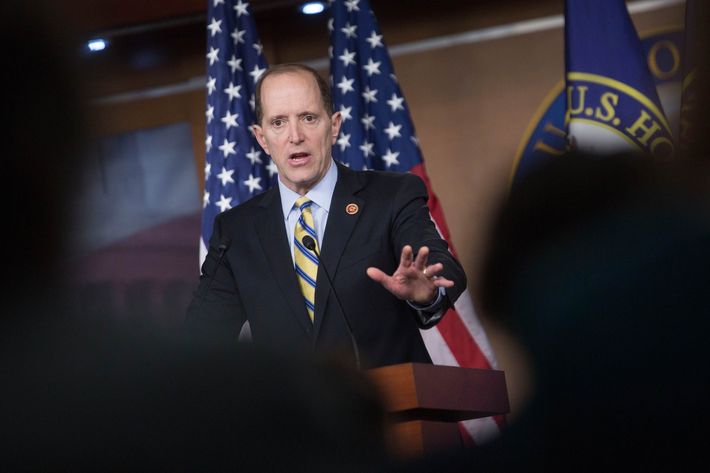
When House Ways and Means Committee Chairman Dave Camp released his tax-reform proposal a few weeks ago, Republicans reacted coolly, but none quite matched the sheer ballistic hostility of the financial industry. What set off Wall Street was a tax Camp levied on the largest banks. Their size made them “too big to fail,” thus lending them an unfair advantage, which Camp proposed, with shocking rationality, to recoup. The banks, predictably, do not see things this way. Wall Street unleashed a furious campaign to destroy and isolate Camp, canceling all fundraisers for the party until his fellow members agreed to denounce his heresy.
And now Wall Street’s efforts have borne fruit. The Wall Street Journal reports today that more than 50 House Republicans have sent a letter to Camp assailing his financial tax, which they call “arbitrary” and say “threatens our economic vitality by reducing access to credit, curbing economic growth, and worsening our nation’s unacceptably high unemployment rate.” Terms like “arbitrary” and “reducing access to credit” are Wall Street’s ways of saying that anything that reduces the profitability of large financial institutions is unfair and harmful.
Camp’s tax-reform plan – not just the financial tax, but the whole thing — represented a shocking moment in Republican policymaking. Here was not just a vague gesture in the direction of moderation that characterizes most Republican “reform” proposals, but a genuinely serious effort to grapple with trade-offs and impose the real, necessary pain on Republican constituencies that any such effort requires. As an early enthusiast for Camp’s proposal, and also having watched the GOP systematically build a policy agenda around plutocracy for two decades, I thought the mere existence of the document, even if it could not be enacted, was fascinating. It was a Prague Spring for the Republican Party. And now, as the tanks inevitably roll through the streets, it’s worth figuring out how such a remarkable, fleeting moment ever occurred.

The most important thing to understand about the contemporary Republican Party (which is why I wrote a book about it) is that its organizing purpose is to safeguard the economic interests of the very rich. This isn’t the goal of all or most of the people who vote Republican, or even the goal of all its elites, but even if different vectors within the party veer off in different directions, this is the Party’s inevitable thrust.
I’ve been enjoyably debating this analysis for years with Ross Douthat, who disagrees with the GOP’s plutocratic cast, but tolerates it anyway due to his social conservatism, yet he always sees a more populist turn lying just around the corner. He wrote last week that Lee’s plan could “influence a genuinely populist finished product.” That would be nice. I’m not holding my breath.
Douthat and I generally agree about the GOP’s past but split over its future. His most recent column refreshingly contrasts Camp’s plan with the doctrinaire Romney tax-reform proposal, which, he writes accurately, was focused on “creating the lowest possible top rate.” But when Romney was in the midst of proposing it, Douthat was touting Romney’s proposal as the arrival of true populist reform. Romney, he happily declared at the time, would not carry through his announced intention to create the lowest possible tax rate:
No net tax cut for the rich, tax relief for the middle class — while downplaying the perhaps-unworkable, perhaps-not rate reduction. I see some liberals calling this a bare-faced lie, but it seemed much more like a clear-enough promise that if both his goals can’t be achieved, he’ll prioritize the second one over the first — a promise that happens to be good policy as well as good politics. And while I don’t expect liberals to take yes for an answer on this question, Romney’s very public pledges last night seem like a more plausible guide to what he’ll do as president than a deliberately-vague blueprint adopted under primary season duress.
By the way, the documentary of Romney’s campaign shows him, upon learning that he would lose, immediately sinking into a depression and blurting out, “I believe that we’re following the path of every other great nation, which is we’re following greater government, money, tax the rich people, promise more stuff to everybody, borrow until you go over a cliff.” Does that sound like a man who was poised to use his power to increase the share of taxes paid by the rich?
The whole point of the push-back from Wall Street, which has reinforced a wildly unenthusiastic reception within the GOP, is not only to prevent Republicans from striking a deal with Democrats and actually passing a tax reform, which could happen if Republicans wanted it. (There’s no law against Congress doing stuff in a midterm election year – the 1986 Tax Reform Act passed with bipartisan support in the sixth year of the Reagan administration.) It’s to murder his plan in a public way so as to prevent it from becoming the baseline for any future Republican agenda. That effort seems to be meeting with predictable, depressing success.
It leaves unanswered the basic mystery of why Camp thought he could write a plan like this in the first place. Sources I’ve asked believe Camp was playing a kind of double game, an interpretation that closely fits all the public reporting. He promised Republicans he could produce a tax reform that would lower the top rate to 25 percent, a holy grail of GOP policymaking, and which would produce a massive windfall for the rich. He had also given lip service to making sure his reform did not decrease tax revenue or increase the tax burden on the poor and middle class.
Meeting all these goals was arithmetically impossible. But Republican fiscal proposals usually come face-to-face with arithmetic impossibility. It is their oldest and most bitter foe. Usually they step around with some kind of evasion or chicanery. Camp actually gave in and acceded to his other, un-emphasized goals of revenue and distributional neutrality (that is, ensuring his plan raised the same amount of tax dollars and didn’t shift the burden downward). Nobody outside of Camp and a handful of allies seems to have realized this until the plan was already out in the open.
A telling comment came from Dean Zerbe, a former Republican tax aide and current tax lobbyist, who told Politico that Republicans would look at Camp’s plan and think, “I’m having the world coming down on me … all this just to get the rate down four points?” The interesting thing about this line is “the.” Camp’s plan cuts tax rates across the board, by significant levels for some taxpayers. “The” rate means the top tax rate, the one affecting the top couple percent of taxpayers. Zerbe assumes, no doubt correctly, that this is the one rate they actually care about.
*This article appears in the March 24, 2014 issue of New York Magazine.






























